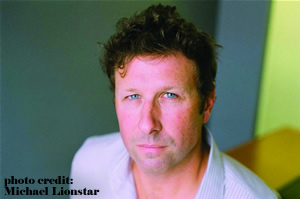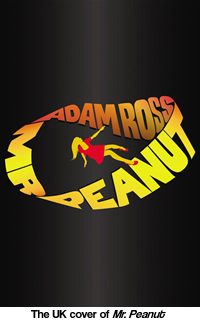About the Naughty Bits
Adam Ross’s Mr. Peanut makes a surprising British shortlist
In Great Britain, people take their writers seriously: across the country, bookies lay odds on shortlist favorites for both the Booker Prize and the Nobel with the kind of fervor reserved in the U.S. for March Madness or the Super Bowl. But even in Great Britain, the Literary Review’s annual Bad Sex in Fiction Award inspires a different kind of excitement. This year the shortlist includes Mr. Peanut by Nashville’s own Adam Ross.
The monthly Literary Review, arguably England’s most influential literary publication, inaugurated the award in 1993 to ”draw attention to the crude, tasteless, often perfunctory use of redundant passages of sexual description in the modern novel, and to discourage it.” This last goal may be working, though perhaps too well: Andrew Morton, England’s former poet laureate, recently observed that not much sex of any kind is being written by serious literary novelists. “It’s as if they were paranoid about being nominated for the Bad Sex Award,” he said. New trends notwithstanding, the prize has been awarded in the past to some of contemporary literature’s biggest names, including Tom Wolfe and Norman Mailer.
 This year Ross’s competition for the award includes both Christos Tsiolkas, who also appeared on this year’s Booker longlist, and Jonathan Franzen, who earlier this fall became the first novelist in a decade to grace the cover of Time magazine. As for Ross, Mr. Peanut has just been named to The New York Times list of the 100 Notable Books of 2010, and Ross himself was recently invited to read at the Folger Shakespeare Library in Washington D.C. as part of the Pen/Faulkner reading series. He will also be in New York one week from today for the announcement of the Center for Fiction’s 2010 Flaherty-Dunnan First Novel Prize. Ross answered a few questions from Chapter 16 by email about the 2010 Bad Sex in Fiction Award, which will be announced tonight in London.
This year Ross’s competition for the award includes both Christos Tsiolkas, who also appeared on this year’s Booker longlist, and Jonathan Franzen, who earlier this fall became the first novelist in a decade to grace the cover of Time magazine. As for Ross, Mr. Peanut has just been named to The New York Times list of the 100 Notable Books of 2010, and Ross himself was recently invited to read at the Folger Shakespeare Library in Washington D.C. as part of the Pen/Faulkner reading series. He will also be in New York one week from today for the announcement of the Center for Fiction’s 2010 Flaherty-Dunnan First Novel Prize. Ross answered a few questions from Chapter 16 by email about the 2010 Bad Sex in Fiction Award, which will be announced tonight in London.
Chapter 16: What was your first thought on learning you’d been nominated for this prize?
Ross: Who’s this Franzen guy?
Chapter 16: Clearly, you’re biased, but which book would get your own vote if you were on the prize committee?
Ross: It would be a tossup between Franzen and me. I know he wants it as badly as I do. We saw each other at the Miami Book Festival this weekend—he signed my copies of The Corrections and Freedom—and he couldn’t even bring himself to mention it.
 Chapter 16: Some critics in Great Britain are concerned that fear of being nominated for this award is keeping serious authors from writing sex scenes. Do you agree?
Chapter 16: Some critics in Great Britain are concerned that fear of being nominated for this award is keeping serious authors from writing sex scenes. Do you agree?
Ross: I don’t think Martin Amis or Philip Roth can ever be kept from writing sex scenes. The real question is this: when will Marisha Pressl and Nicole Krauss write a sex scene together? They are total babes. I would seriously get into reading that.
Chapter 16: What’s your own favorite sex scene in literature?
Ross: Pretty much any sex scene from James Salter’s remarkable A Sport and a Pastime.
Chapter 16: What’s the most erotic scene in literature you’ve ever read that doesn’t involve actual sex or even bodily contact?
Ross: Without question, Humbert Humbert’s description of Lolita playing tennis.
Chapter 16: What great work of literature really ought to have a nookie scene but doesn’t?
Ross: Duh. Madame Bovary. Though let’s face it: Jane Eyre really needed to get laid.
To read Chapter 16’s news page about Mr. Peanut, click here. To read a longer interview with Ross, click here. For more updates on Tennessee authors, please visit Chapter 16‘s News & Notes page, here.